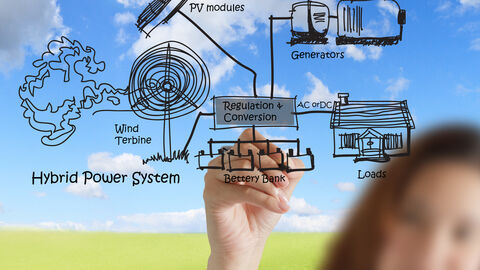This measure was implemented in cooperation with the Gesellschaft für Internationale Zusammenarbeit (GIZ) and funded by the Federal Ministry for Economic Cooperation and Development (BMZ) within the framework of the project "Reform of Vocational Training in Vietnam".
The participants were 13 vocational school teachers from two vocational schools in Vietnam who were trained in photovoltaics at our institute in 11 weeks.
Implementation of the measure by the HLfT
- Programme creation/ programme booklet
- Implementation of the programme:
Teaching by qualified teachers
Provision of classrooms and laboratory equipment
Entire organisation including the realisation of field visits
Airport transfer, transport within the project
Payment of daily allowance
Social support
Catering on day of arrival
Organisation of welcoming and valedictory dinner - Management of programme funds according to GIZ guidelines
Modules:
Fundamentals of Renewable Energy (20 hours)
The various renewable energy sources were examined regarding their usability in terms of quality and quantity. Based on selected examples influencing factors such as geography, ecology, economy and politics were recorded and assessed.
Photovoltaics (80 hours)
The participants got to know the physical and technical interactions in power generation with solar cells. They planned systems for grid feed-in, selected the type of energy measurement, assessed yield and cost efficiency with the help of simulation programmes and commissioned model systems for grid feedin.
Autonomous Systems (40 hours)
In this module autonomous electricity supplies were planned with photovoltaics. In the process, suitable components were dimensioned and selected regarding cost efficiency and longevity. In addition, the integration of further energy producers into an autonomous network was discussed.
Intelligent Energy Systems (100 hours)
The participants planned generating plants from renewable energies, preferably photovoltaics, and integrated them into existing installations of clients in accordance with national regulations. They selected the system concept and suitable components, installed and parameterized these for the desired functionality in compliance with safety regulations and set up remote monitoring.
Installation Project (40 hours)
In this project a photovoltaic system was planned and put into operation. For analysis, planning and calculation typical calculation models and software tools were used. The co-operation of the participants and the mutual exchange of ideas and information was required.
Lesson Planning (56 hours)
The group learned under which aspects action-oriented teaching is planned and carried out based on competencies. In addition the participants tested the previously planned lessons and reflected on them. In plenary the lessons were discussed and evaluated.
Instructional Methods (24 hours)
Action-oriented teaching methods were tried out and reflected in terms of competence promotion and learning conditions. In a further step, the participants went through the phases of the self-organised learning framework (SOL) and analysed the individual process steps.
Instructional Media (24 hours)
The use of media in technology lessons was reflected and decisions were taken to support addresseefriendly learning processes. Selected media were created, tested and assessed.
Field Visits
Five excursions in the area of renewable energy were selected to complete the training modules:
- SMA Solar Technology PLC, Niestetal
- Trade Fair Intersolar, Munich
- Energy Landscape, Morbach
- Photovoltaic Construction Site, Stockstadt
- Biogas Plant, Wallerstädten
Weekend Activities
The group undertook trips to Mannheim, Frankfurt und Mainz. Another highlight was the visit of Rüdesheim with a boat tour on the Rhine. As part of the field visit to the fair Intersolar in Munich tourist aspects were also taken into account.
